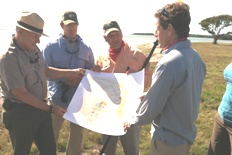|
Florida Wildlife Expedition Shoves Off  January 23, 2012 | WMFE - One thousand miles in one hundred days. That's the goal of a wildlife expedition that's intended to call attention to the need to connect the state's disjointed wild areas into a contiguous wildlife corridor. Today, the group is paddling through some of the most remote swamps in the Everglades. The sun is slowly rising over Florida Bay, warming the chilly breeze that's about as cold as it ever gets at the southern tip of the state. Turkey vultures roost nearby in a dead tree bleached white, hoping for a few scraps from the breakfast being cooked on a Coleman stove. The scrambled eggs and Jimmy Dean sausage is probably the last good hot meal these folks will have in quite a while. Because where they're going, they're more likely to run into alligators than people. Four conservationists are now paddling through some of the most remote swamps in Florida. It's the first leg in the Florida Wildlife Corridor Expedition. I joined them as they took the first steps in a thousand-mile journey up the central spine of Florida. Their mission: publicizing the need to connect the state's disjointed natural areas into a continuous wildlife corridor. They'll paddle through the Everglades, bike through the Picayune Strand State Forest and hopefully end their journey wading through the Okeefenokee Swamp at the Georgia state line. Carlton Ward Jr., a conservation photographer from Clearwater, has been on expeditions before, in places as remote as Central Africa. But this one is just a little different... "It's kind of an exercise on what not to do in an expedition in terms of ... we just weren't fully able to test all of our gear ahead of time. A lot of this is on the fly," he says. When asked by a reporter if he got any sleep before their start, he says, "I can't think of a week in my life where I've slept fewer hours than this one. But I've also never packed for a hundred-day expedition before." Ward says he'll probably run on adrenaline the first couple of days. That's also the most remote part of their journey. The group is now paddling north through the liquid heart of the Everglades - the Shark River Slough, They likely won't see a soul for days. "The wilderness waterway could have some travelers this time of year, and after our third night we're going to turn left up toward the open sawgrass, the Shark River Slough, and if we see anyone there, it'll be maybe a park biologist or a Calusa Indian who's been hiding out for a couple of centuries," he says. When asked by a reporter if he's looking forward to seeing "interesting" species, like a python, Ward says, "Well, it would be interesting. I'd like to taste python, rather than it taste me." Ward will be trekking with bear biologist Joe Guthrie and, for about a quarter of the trip, with conservationist Mallory Lykes Dimmitt. She's is a member of the family that owns the Tampa agribusiness firm Lykes Brothers "I think it's an opportunity to give the public - most of whom live on Florida's coasts - eyes and ears into the inner part of Florida, that a lot of people don't honestly get a chance to experience," she says. "A lot of people wouldn't choose to go on a hundred-day trip, and this way they could live virtually, through us." That virtual journey will be documented by cinematographer Elam Stoltzfus, who will produce a film about the journey. Seeing them off at the southern tip of the state is Dan Kimball, superintendent of Everglades National Park. He calls the expedition a "great adventure." "I think it really does put a spotlight on this imperiled landscape," says Kimball. "We've got not only problems with the water quality and quantity and time of distribution, but also we have issues with endangered species and exotics. And this will be a great story to tell over a thousand-mile journey over 100 days." And with that sendoff, the group's kayaks slipped into Florida Bay, slowly disappearing into the mangrove swamp.
|
|
|